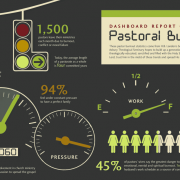The Moses Model?
I was raised in the congregational rule of the Christian Church. I later scuttled that model for the more Scriptural model of presbyterian rule – a collegial model. I easily dismissed the Episcopal model as being too open to abuse by aberrant personalities. I was dismayed when Pastor Chuck Smith outlined an episcopal ecclesiology (please note the small ‘e’). It rattled me to hear him speak of the authority of the pastor as being superior to that of the elders.
Pastor Chuck did outline a positive role that elders play and the relationship between pastor and elders – and the Christlikeness that should govern that relationship. But when push came to shove, no one could push and shove the pastor.
As I thought through the issues related to church government and the more I gave consideration to Pastor Chuck’s understanding of how authority is to be exercised in the context of the local church, the more I found myself comfortable with and coming into alignment with a Biblical view of episcopacy as related to the exercise of authority in the local church. This is a huge question: Who has authority and how is this authority wielded?
Authority, and the hierarchy of authority, is built into the very fabric of the cosmos, from the Godhead to human government to business to sports to marriage to the church. Anarchy, an attempt to destroy or escape hierarchy, is a rebellion against the very structure of the universe. Hierarchy literally means ‘the rule of priests’, but it is used pragmatically for any organization that has established authority and lines of accountability. Headship and authority are implicit within the structure of the created order because they are implicit within the structure of the Uncreated Order. What follows are several lines of reasoning supporting the practice of episcopacy, i.e., pastoral authority within the Calvary Chapel family of churches.
There is hierarchy in the Trinity. There is an economy within the Trinity whereby one member of the Godhead is submitted to another member of the Godhead for the purpose of accomplishing the intentions and plans They have jointly decreed.
He who does not love Me does not keep My words; and the word which you hear is not Mine, but the Father’s who sent Me. John 14:24
But when He, the Spirit of truth, comes, He will guide you into all the truth; for He will not speak on His own initiative, but whatever He hears, He will speak; and He will disclose to you what is to come. John 16:13
We see the Son not doing anything apart from the command of the Father who sent Him. The Holy Spirit is submitted to both the Father who sent Him and the Son whose ministry He applies to the hearts of humankind.
There is hierarchy in the home –
But as the church is subject to Christ, so also the wives ought to be to their husbands in everything. Eph 5:24
There is order in the home and family. This order is not established by the notion of equality, but through the notions of headship and submission.
There is hierarchy in the workplace. If there is no headship in business, in government, in the home – order breaks down. The plans and intentions of that business, government, home will never be realized apart from headship and submission implicit in hierarchy.
Many, at this point, will call attention to the fact that the terms “elder” (presbyter), “overseer” (episcopos), and ‘shepherd’ (pastor) are all used interchangeably with no hint of hierarchy within the servant leaders of the church. See Acts 20:17 & 28; 1 Pet 5:1-2.
In these two passage we find that an elder is an overseer is a pastor. A presbyteros is an episkopos is a poimainos. If one is equal to another, from where do we cull the principle of hierarchy? If, in the description of these offices there is no distinction between these offices, how does one rise above another?
Please note: along with the description of church government we also see the practice of church government in the NT Scripture. In the application of authority to the life of the church there emerges a very real and defined hierarchy. Consider the following situations as reported in Scripture –
- Paul gave decided leadership to his apostolic band – a very definite hierarchy. The notion of a democratic approach would have struck Paul as odd.
- In Acts 15, it was James, the brother of our Lord, who stood up after much debate and counsel among the elders and apostles and gave the definitive statement concerning the place of the law in the life of the Gentiles who had come to Christ. The gathered leadership deferred to and agreed with him.
- Both Timothy/Titus exercised pastoral authority over the churches in which they were ministering. They exampled hierarchy.
In the NT we have a picture of local churches/ministry teams where an explicit hierarchy emerges every time. You cannot find one example in the NT of a collegial group of men where one does not emerge as the recognized leader to whom the others defer and follow.
The New Testament model of church government takes into consideration the full scope of both the descriptive passages and those detailing the practical application of these ministry offices in actual experience.
In further support of hierarchy as a pattern for church government we have the seven angels of the churches in Revelation 2-3. The line of reasoning here is very simple. John addresses each letter to a single individual, the angel of the church. No doubt, this is the pastor of the church. Without argument, the whole church is in view, yet only one individual is being addressed and singled out for the bulk of the warnings, promises, and exhortations.
Revelation 2:2-4 is a representative passage illustrating this fact:
I know your deeds and your toil and perseverance, and that you cannot tolerate evil men, and you put to the test those who call themselves apostles, and they are not, and you found them to be false; and you have perseverance and have endured for My name’s sake, and have not grown weary. But I have this against you, that you have left your first love.
The bolded words ‘your’ and ‘you’ in the foregoing reflect 2nd person singular verbs and pronouns. This pattern is followed in each of the letters to the seven churches. The Lord is holding the pastor responsible for the spiritual condition of the church. In contrast to this, please note the grammar of Revelation 2:24
But I say to you, the rest who are in Thyatira, who do not hold this teaching, who have not known the deep things of Satan, as they call them–I place no other burden on you.
The bolded ‘you’ in the foregoing translates the 2nd person plural pronoun. The Lord is speaking to a single individual, the pastor, and then, when He intends to address the larger church, the grammar itself reflects this change of address.
If exegesis means anything, we have to account for the alternation of grammar in the passage under study. The use of person in the verbs and pronouns in the seven letters to the churches in Revelation support the hierarchy of episcopacy in church government.
God holds the pastor accountable for the spiritual health and direction of the church because the pastor holds the responsibility for these things.
It is noteworthy that the early church immediately following the generation of the apostles found themselves gathering around the bishops of the church. Hierarchy is an inescapable principle in the cosmos. We see it in the Uncreated Order, in the created order, and in the redemptive order – in the church. Yes, hierarchy can be abused and has been abused – but so have the congregational and presbyterial models. The weakness isn’t with the model, but with ungodly men who will corrupt any model. Though many practice collegial and congregational forms of church polity, hierarchy as episcopacy has impressive Biblical credentials.
The practice of this episcopacy is not expressed in arbitrary, oppressive, abusive, unaccountable leadership. New Testament episcopacy is not opposed to collegiality, mutual submission, and team wisdom – but that is matter for another article.









